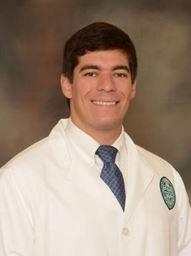
Derek Neupert, MD, was first drawn to neurology after he saw the lasting, devastating impact a stroke had on his grandmother. As a resident, however he became fascinated with the way clinical neurophysiology allowed him to interpret data in real time and then use that data to guide his decisions. In this week’s “Spotlight” interview, our new clinical neurophysiology fellow talks to us about his interests in neurology, his case study that was just published in the Neurohospitalist, and his plans for after he completes his fellowship.
Welcome to the Duke Neurology Department! What are your current responsibilities as a clinical neurophysiology fellow? What does a typical day for you look like?
Thank you for the warm welcome, and I am very excited to be starting at Duke! The fellowship in clinical neurophysiology is a one-year program that provides subspecialty training in the evaluation of patients and interpretation of neurodiagnostic studies. Among other things, our focus at Duke mainly involves the management of epilepsy patients, electroencephalography (EEG), and neurophysiologic intraoperative monitoring (NIOM).
How and when did you decide to become a neurologist? What interests you the most about clinical neurophysiology in particular?
One of the driving factors that led me to pursue a career in neurology was the lasting impact of my grandmother who suffered from a stroke. Within clinical neurophysiology, I find it very fascinating being able to interpret data in real time as it relates to a patient’s neurologic condition and how this guides their medical management.
You just completed your residency at the Tulane University School of Medicine. What’s one experience or element of that program that stands out as being especially memorable or useful?
The people. Tulane is a very close-knit community among the residents and faculty. This environment truly facilitated a very unique and positive residency training experience.
What plans do you have for after you complete your fellowship? If you could have any job in the world what would it be?
I am very excited to say that I recently accepted a position at Thibodaux Regional Medical Center, which is located in a very charming community about one hour outside of New Orleans, LA. My clinical duties will include providing a mixture of both inpatient and outpatient neurology care. I can't speak highly enough for the fantastic job Mr. Greg Stock as well as Mr. Napoleon Ortiz are doing at TRMC!
You were the first author of a recent Neurohospitalist article examining aortic dissection in the internal carotid and femoral arteries presenting as stroke. What were the main findings of this study, and how will they improve our ability to provide patient care?
It was a case study and imaging review of a patient we treated at Tulane. He was a middle-aged man who presented to the emergency department with a large left hemispheric ischemic stroke due to an extensive aortic dissection. His dissection continuously spanned from his brain (left internal carotid artery) all the way down to his leg (right femoral artery). The importance of the case was to illustrate his imaging findings, as well as reiterate the need of obtaining emergent vascular studies when you are clinically suspicious that an aortic dissection is the culprit of a large vessel occlusion.
What passions or hobbies do you have outside of your fellowship?
Spending time with my wife and two daughters. We have very much enjoyed the various hiking trails nearby since moving to North Carolina. I am also an avid college football fan… Geaux Tigers!
Neupert enjoys a birthday with family in this photo.